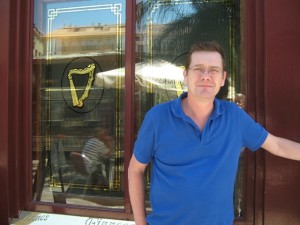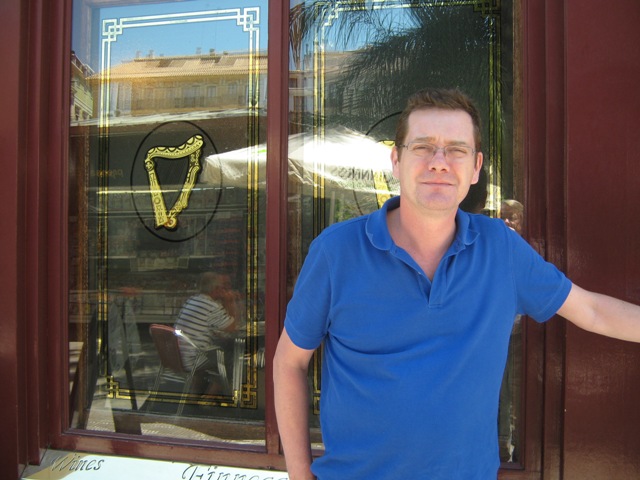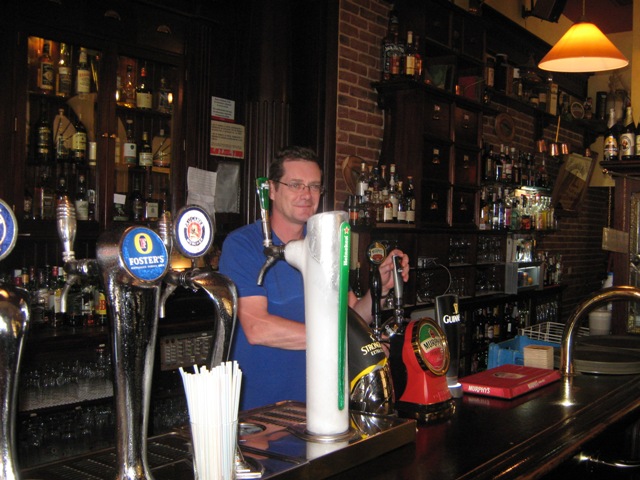All is not lost; Finnegan’s has reopened, although in place and name only.
It seems that a deal has been done to maintain the name, although Peter Finnegan will no longer be involved.
In the dark distant past, foreigners in Valencia were forced to drink Spanish beer; until one day, like a fairy godmother, Finnegan’s appeared!
Sometimes a word becomes so much a part of your everyday language that you forget what it is you’re actually saying. Here in Valencia, on the banks of the wide, majestic River Turia, it’s as common as a green bean in a paella to arrange to meet in Finnegan’s, forgetting as often as not and as frequently as often seems inappropriate, Finnegan’s is called so because it is after all someone’s name.
I have emptied my pockets and risked missing my mortgage payments for so long on account of time passed among this veritable forest of wood panelling that I had expected ‘Finnegan’ to be a wizened old man sitting in a dark corner somewhere counting grubby old bank notes and filling a not necessarily closeby spitoon, so I was surprised to discover that he was in fact only born in 1964, and is as such practically a child, and in possession of a lucid mind (which admittedly made the interview a bit one-sided).
Peter Finnegan hails taxis and from the town of Dalkey near Dublin. As his father was a publican and his elder brother too, and having lived over the family pub (a photo of which can be seen to the left of the bar) since he was six years old, it was only natural that on leaving school he should choose to work for a Building Society. He worked there in fact for eleven years, the last five of which he was the manager.
Peter in fact does not look like your typical publican, being fairly tall and definitely bespectacled rather than fat and bald, and speaking clearly and articulately rather than swearing and spitting and throwing chairs across the street at me like most barmen of my acquaintance. In fact he looks like a Building Society Manager.
Being the fifth of seven children, family is clearly very important to him, and two of his brothers and his father still run the pub in Dalkey, which mysteriously enough is called ‘Finnegan’s’.
 As he talks about his life it becomes hard to keep track of the brothers and sisters who pop in and out of his story, and when his in-laws join the fray the story takes on epic, Ulyssesian proportions, like a far more civilised version of ‘War and Peace’ with pleasant trips back home replacing relentless trekking across the icy Russian steppes.
As he talks about his life it becomes hard to keep track of the brothers and sisters who pop in and out of his story, and when his in-laws join the fray the story takes on epic, Ulyssesian proportions, like a far more civilised version of ‘War and Peace’ with pleasant trips back home replacing relentless trekking across the icy Russian steppes.
One family member who stands out is his brother Donal, who appears to have been the driving force behind Peter’s entrepreneurial adventure, and the man responsible for depriving Valencia of yet another English teacher who would really rather be doing something else. Peter tried his hand at teaching for one and a half years when he first arrived here, but decided that he didn’t have the patience (or good looks, charisma and selfless dedication?) for this noble but humble profession.
Peter’s reason for coming to Valencia was (and is) Maria, who, like so many Valencians, visited Ireland on student exchanges and later (like fewer Valencians) did a Masters Degree in Psychology at Trinity College Dublin. Maria listened to Peter’s mother and decided not to get involved in her husband’s business, although she does take care of the paperwork. They did however follow Peter’s father in the sense that, like his family in Ireland, they live above the pub, although three metre thick sound-proofing ensures that they don’t hear the breaking glasses, screams of pain or sirens from below.
When the decision to open an Irish pub was made, Peter had the experience of his family, especially the support and driving force of his brother Donal to help him. He didn’t however have a nearby model to copy. Back in the grim, smoky days of 1994 there were no other pubs of this nature, unlike today when you can barely walk around inside one without tripping over.
He had to spend six months looking for premises before discovering an empty ground floor site in the shadow of Valencia Cathedral’s emblematic Miguelete tower. Although it was a quiet square at the time it has now developed into one of Valencia’s most successful leisure and tourist areas and even earned the dubious honour of achieving MacDonald’s status.
A contract was signed in November 1994 and work began in March 1995. Most of the interior work, the distinctive wood panelling, was done by a Northern Irish company whose workmen were just returning from another job in Japan, and who were, as we spoke, doing another job coincidentally at the family pub back in Dalkey. The distinctive panes of glass were supplied by a Dublin company.
By October 1995 they were ready to open, having overcome all the obstacles laid before them by the dedicated civil servants of Valencia Town Hall.
The pub was an instant success, and Valencia’s ex-pat community was able to establish a serious pecking order; those who were B.F. (Before Finnegan’s) and those who came after.
 Today it’s hard to imagine that there was once a time when people would stand in the shadow of Valencia’s cathedral and be transported back to that historical epoch before you could get a decent pint of Guinness in Valencia. Today’s youth are spoilt for choice with Irish pubs springing up like unemptied ashtrays. But those of us who sit drooling into our empty glasses in a corner can, for the price of a pint thank ye sonny, be called upon to tell gruesome tales of supping twelve pints of San Miguel and of years of permanent flatulence (although that may just have been me).
Today it’s hard to imagine that there was once a time when people would stand in the shadow of Valencia’s cathedral and be transported back to that historical epoch before you could get a decent pint of Guinness in Valencia. Today’s youth are spoilt for choice with Irish pubs springing up like unemptied ashtrays. But those of us who sit drooling into our empty glasses in a corner can, for the price of a pint thank ye sonny, be called upon to tell gruesome tales of supping twelve pints of San Miguel and of years of permanent flatulence (although that may just have been me).
The Finnegan dynasty has grown over the years, and Peter and Maria’s two sons (Peter and Daniel) now occasionally lend a hand in the pub during the holidays. Peter Junior is in fact off this summer to Brazil to collaborate with an NGO.Their daughter Maria, who is nine, has been excused bar work for the moment.
The kids, like so many of the new generation of ex-pats, are fully integrated in Spain, attending a normal Spanish school and speaking Spanish as their native tongue.
Finnegan’s also has a participation in a tapas bar next door which, at one time, was run by one of Peter’s brothers. It is called ‘Vintara’, an interesting name, although nobody seemed to have the slightest idea what it means.
Like most of us who have stuck it out here for more than a couple of years, Peter has no desire to return ‘home’ to live, although he manages to go back for a visit at least once a year, but as he himself said; “nowadays Ireland comes to me”.
The initial staff of 5 when they opened soon rose to 10 and you’ll never be short of a bit of brogue on both sides of the bar at Finnegan’s or a chance to practise your English with occasional Quiz and Trivial Nights, as well as all the international sports on satellite TV.
You can also practise eating British and/or Irish food seven days a week with such delicacies as jacket potatoes, cottage pie or, at moments of serious nostalgia, rhubarb crumble.
Finally, after enormous mental strain and literary struggle, I had given up trying to wangle ‘Finnegan’s Wake’ into the title of the article. Fortunately Peter helped me out. The first page of the book is stencilled on a thin strip of paper all the way around the bar. (Start near the side entrance and try not to step on other people’s tables as you follow it around!)
Fin
negan’s is dead; long live Finnegan’s!


